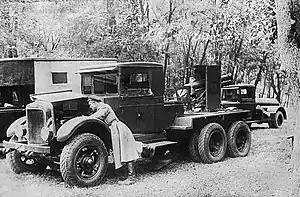SU-12
The SU-12 (Russian: СУ-12) self-propelled gun battery (gun truck) was created in 1934 by the Union of Soviet Socialist Republics by mounting a 76 mm regimental gun M1927 onto a modified GAZ-AAA truck, and was in production from 1933 to 1935.[1] The cannon's barrel and recoil system were modified to reduce recoil. It was the Soviet Union's first self-propelled gun. It had a four-man crew, including the driver, and the gun could rotate 270 degrees.[2]
| SU-12 self-propelled gun battery | |
|---|---|
 SU-12 (based on а Moreland truck) after maneuvers. Kiev Military District, 45th Mechanized Corps. Autumn 1933. | |
| Place of origin | Soviet Union |
| Service history | |
| In service | 1933–1938 (SU-12), 1941(SU-1-12) |
| Used by | Soviet Union |
| Wars | World War II Winter War Soviet–Japanese border conflicts |
| Production history | |
| Designer | Leningrad Kirov Plant |
| Designed | 1933 |
| Manufacturer | Kirov Plant |
| Produced | 1933-1935 |
| No. built | 48 (SU-12), 51 (SU-1-12) |
| Specifications | |
| Mass | 3.7 tons |
| Length | 5.61m |
| Width | 1.9m |
| Height | 2.325m |
| Crew | 4 |
| Armor | 4 mm gun shield, 4 mm roof plate, 4 mm rear shield, 2 mm rear window (SU-1-12 only) |
Main armament | 76 mm regimental gun M1927 (36 rounds) |
| Engine | GAZ M-1 |
| Suspension | Leaf spring |
Operational range | 370 km |
| Maximum speed | 60 km/h, highway |
The SU-12 had no armor protection. This was corrected in the SU-1-12 model which added a front shield and roof armor of 4mm thickness. As time went by more armor, in the form of a 2mm rear window and a 4mm rear shield, were added to the SU-1-12 models. Most SU-12 units were decommissioned by 1938, but the Su-1-12 models served in the Battle of Lake Khasan, the Battles of Khalkhin Gol, and in the Winter War against Finland.[1] By 1941 only 3 were left in service and had been supplanted by tracked SPGs.
Other specifications
- fording depth=0.82 m
- obstacle height=0.75 m
- ditch crossing=2 m
- ground pressure=0.68 kg/cm2
- gun elevation=-5°/+25°
- gun range of motion=270°